Hydrolyzed whey protein is a special form of whey protein that’s particularly suited for fast absorption and low allergenic potential.
Normally, your body does the hydrolyzing itself (a chemical process that involves breaking down the bonds of the whey protein molecules) in your stomach and your small intestine.
In the case of hydrolyzed whey protein, enzymes are used during the manufacturing process to initiate this process.
The degree to which the whey protein is hydrolyzed depends on the manufacturing process, but as a general rule, the greater the amount of hydrolyzing, the more rapidly the protein will be absorbed.
If you want rapid recovery and quick delivery of branched chain amino acids to your muscles following your next gym session, check out our rankings. We’ve come up with the ten best sources of hydrolyzed whey protein for serious athletes.
Research
Rankings
1. Ladder Whey Protein Powder
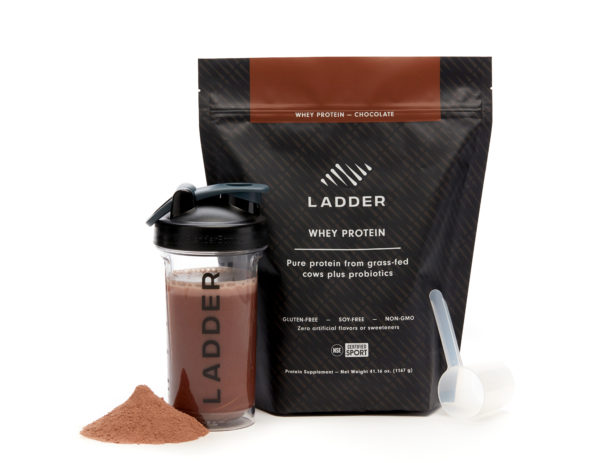
Ladder whey protein is the brainchild of Adam Bornstein and Lebron James, and provides the premier choice for anyone looking to add whey protein to their supplement regimen.
This athlete-focused formula provides a mix of fast and slow digesting protein to ensure your muscles are always being provided the optimal building blocks for maximum performance. Ladder protein is also one of the only formulas on the market to be NSF-certified for sport, making it safe for even the most strict of athletes.
BodyNutrition’s #1 choice.
2. Muscle Feast Hydrolyzed Whey Protein
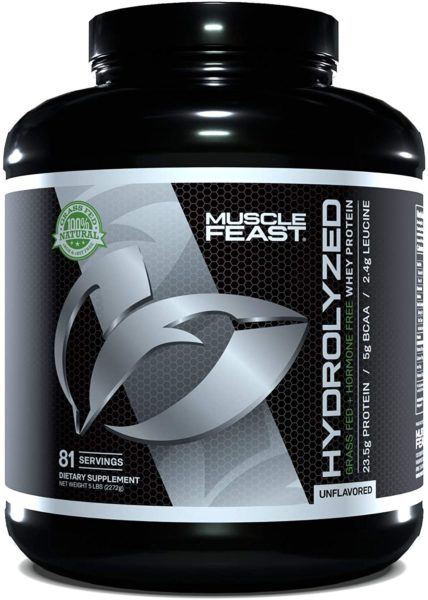
Muscle Feast makes a clean, simple protein with only one ingredient: hydrolyzed whey protein. No binders, emulsifiers, preservatives, or flavoring agents to be found here.
Of course, those who want an easy to blend supplement that doesn’t have the characteristic chalky taste of protein powder might disappointed, but this is one of the best products out there for those who value minimalism and simplicity in their protein powder.
3. Sascha Fitness Hydrolyzed Whey Protein Isolate
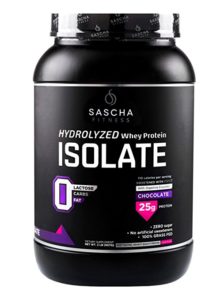
Sascha Fitness is what you might call a “high end” protein powder. It has a few extra perks that make it higher quality than a lot of the competition.
For starters, it uses protein derived from grass-fed cows, which is healthier overall. It also includes a selection of enzymes to aid with digestion, and is flavored with stevia.
4. Optimum Nutrition Platinum Hydro Whey
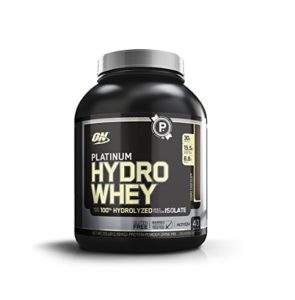
Optimum Nutrition’s Platinum Hydro Whey protein powder is a top-class hydrolyzed whey protein because all of its whey protein content is 100% hydrolyzed.
In addition to hydrolyzed protein, which has a high branched chain amino acid content to begin with, Optimum Nutrition also includes additional BCAAs for increased muscle recovery abilities.
It’s flavored with a combination of natural and artificial flavors and sweeteners, which will be somewhat of a turn-off for purists, but for everyone else it’s a good choice.
5. BulkSupplements Hydrolyzed Whey Protein
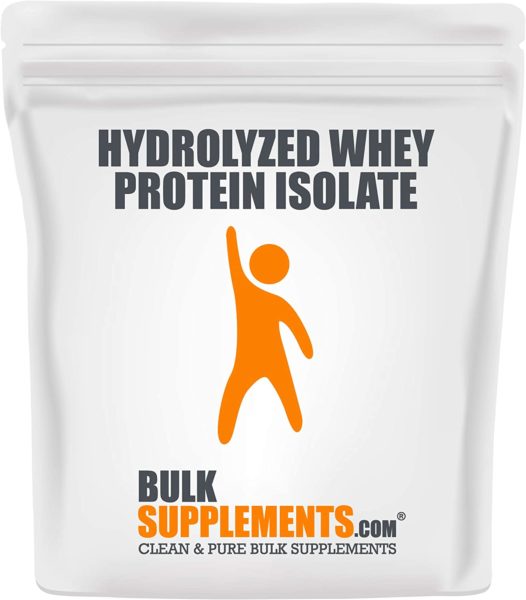
BulkSupplements shines when it comes to ultra-simple, ultra-pure products, as their supplements are tested by a third party for purity.
It’s a perennial favorite among minimalists and do-it-yourselfers, as BulkSupplements is hard to beat when buying large quantities.
The only drawback is that the zipper-top bag is sometimes difficult to close, but aside from that, it’s a great product.
6. Progenex Thr!ve
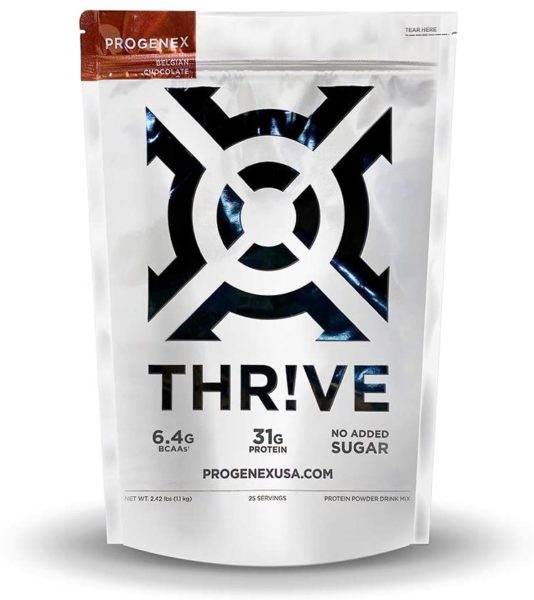
Progenix offers a fairly straightforward hydrolyzed whey protein powder that’s flavored only with natural flavors and sucralose.
Low carb enthusiasts might balk at its moderately high sugar content (7 grams per serving), but it’s a good balance between simplicity and ease of use.
Since it has a few emulsifiers and flavoring agents, it’ll be easier to mix into a smoothie or a shake, and it will taste better than unflavored powder.
7. Dymatize ISO 100
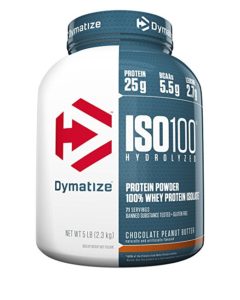
Dymatize ISO 100 is a mixture of hydrolyzed whey protein and regular whey protein isolate, meaning that it won’t be absorbed as rapidly as a 100% pure hydrolyzed whey protein blend.
This could be a good or bad thing depending on your workout needs, but if you are looking for hydrolyzed whey protein to begin with, chances are you want something that’s rapidly absorbed.
Its flavoring profile is pretty standard; it comes in three different flavors, all of which use a mixture of natural and artificial flavors, as well as sucralose to sweeten the supplement.
8. BSN Syntha-6 Edge
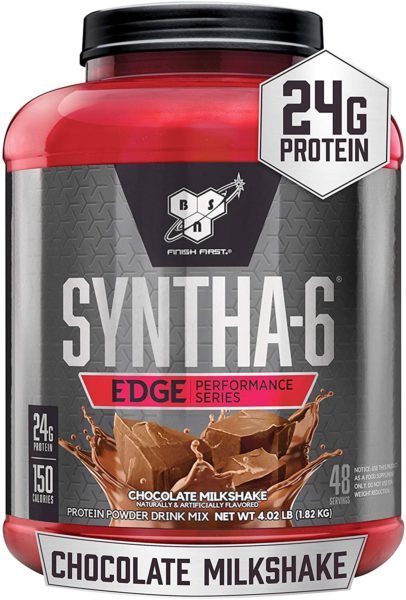
BSN’s protein powder is a top seller, but unfortunately it comes up short when comparing it to other hydrolyzed whey protein supplements.
The amount of whey protein that’s actually hydrolyzed in BSN Syntha-6 Edge is quite small, and it’s got a lot of extraneous ingredients that will be counterproductive to your workout, like sugar for flavoring.
While it does taste good, most people will have better success with a cleaner and more pure hydrolyzed whey protein powder.
9. Precision Protein
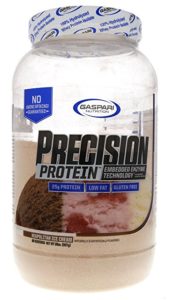
Precision Protein offers a hydrolyzed whey protein supplement that’s fairly solid, but has a few too many preservatives and flavoring agents.
Other competitors get by with a lot less, and there aren’t really any other major perks to this protein powder, making it hard to endorse over some of the other competition.
10. Amazing Muscle Hydrolyzed Whey Protein
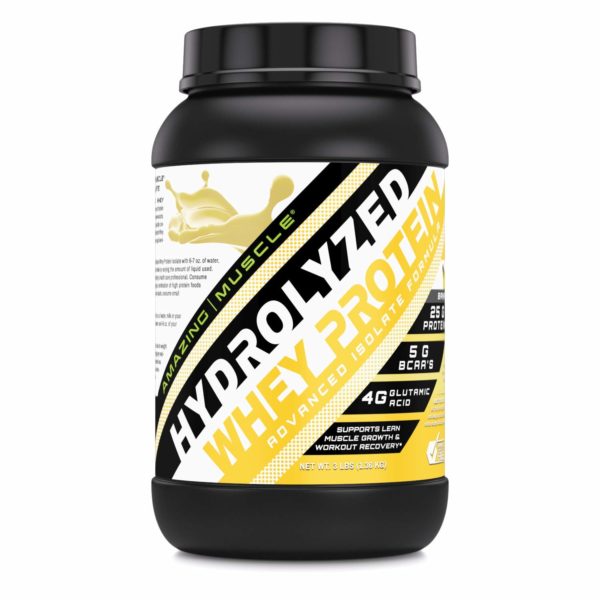
Amazing Muscle Hydrolyzed Whey Protein is 100% hydrolyzed whey protein, which is great to see. However, the use of artificial flavorings knocks it lower down in the rankings than it otherwise would be—unless you don’t mind artificial ingredients, you may want to opt for a naturally-flavored hydrolyzed whey protein instead.
Category winners
Best hydrolyzed whey protein overall: Ladder Whey Protein Powder
Ladder’s unique combination of whey protein isolate, milk protein isolate, and two billion CFUs of probiotics makes it an incredibly versatile protein powder, whether your goals are weight loss, muscle gain, or workout recovery. Thanks to its great taste and high quality, you really can’t go wrong with Ladder.
Best hydrolyzed whey protein with extra BCAAs: Optimum Nutrition Platinum Hydro Whey
Optimum Nutrition makes top-notch protein powders across the board, a reputation which holds true with this product. Thanks to a boost of micronized BCAAs, you get an unparalleled dose of branched chain amino acid when you go with Optimum Nutrition.
Best hydrolyzed whey protein for women: Sascha Fitness Hydrolyzed Whey Protein Isolate
Sascha Fitness makes a great-tasting hydrolyzed whey protein that also includes digestive enzymes to boost absorption and to prevent stomach problems after tough workouts. It’s a strong pick for women who are serious about their fitness.
Best hydrolyzed whey protein for athletes: Ladder Whey Protein Powder
Athletes will appreciate Ladder’s fantastic taste, probiotics, and especially its NSF certification, which indicates that it’s been independently tested for banned substances. Since it was developed by athletes, it should be no surprise that it’s a great choice for athletes too.
Best hydrolyzed whey protein for weight loss: Muscle Feast Hydrolyzed Whey Protein
Muscle Feast keeps things incredibly simple with this hydrolyzed whey protein: 100% pure, no added sugar, and only a minimum amount of flavoring via stevia for its flavored varieties. Dieters can easily use Muscle Feast on its own, or as part of a meal replacement shake.
Best-tasting hydrolyzed whey protein: Ladder Whey Protein Powder
Ladder uses natural cocoa, natural vanilla flavor, and just a touch of cane sugar in its protein formulation. The sugar is not enough to make it carb-heavy, but in combination with the naturally-sourced flavors it does go a long way towards making this the best-tasting option for hydrolyzed whey protein.
Who should buy hydrolyzed whey protein?
Whey protein is the king of protein powders—it’s the most widely used, best-studied, and for many applications, the most effective type of protein powder out there. Hydrolyzed whey protein is a specialized version of whey protein that’s tailored for rapid absorption.
Why would you want a rapidly absorbed protein powder? Usually, it’s because you are an athlete looking to kick-start your post-workout recovery. Hydrolyzed whey protein is great for initiating muscle growth as soon as possible, or for healing muscle damage done by hard eccentric exercises like squats, hill running, or Romanian deadlifts.
The role of hydrolyzed whey protein can be contrasted with slow-absorption proteins like casein: While casein is less well-suited for use as a post-workout supplement, it shines in other applications where you want a slow, steady influx of protein into your body, like recovery at night.
Some athletes who want to get sophisticated with their protein supplementation routine will use hydrolyzed whey protein for rapid post-workout recovery, and take casein protein or another slow absorbing protein powder before bed for a steady supply of protein while they are asleep.
Interestingly, hydrolyzed whey protein may be useful for weight loss too. While traditional whey protein powder is the usual go-to option for protein for weight loss, some research suggests that the rapid absorption of hydrolyzed whey protein could be helpful for losing weight.
This may seem counterintuitive, because usually you want slowly-absorbing calories (like whole grain carbs as opposed to sugars and refined carbohydrates) to lose weight. The potential utility, however, comes from the ability of protein to generate a feeling of satiety, or fullness.
Since hydrolyzed protein is rapidly absorbed, it creates a greater stimulus on your body’s satiety receptors, potentially creating more of a sense of fullness.
It’s not clear how great of an effect this has compared to a slow-absorbing protein powder, since most studies have compared protein to other sources of calories (i.e. carbs or fat), but it’s worth considering nonetheless.
In sum, hydrolyzed whey protein is a specialized form of whey protein powder that’s best suited as a post-workout recovery shake or as a component in a meal replacement shake for weight loss.
How we ranked
Hydrolyzed whey protein is a pretty simple product, so our single biggest priority was product purity. We only considered supplements whose primary purpose was delivering hydrolyzed whey protein—while hydrolyzed whey protein is a common ingredient in intra-workout and post-workout supplements, or in some combined-source protein powders, most people taking hydrolyzed whey protein are taking it to leverage its unique benefits.
As such, we did not consider any of these multi-source protein powders. Instead, we looked for products that delivered hydrolyzed whey protein with a minimum of additional additives, flavors, and preservatives, particularly if they were synthetic.
Like whey protein generally, hydrolyzed whey protein is known for being a little bland and chalky if it’s not flavored.
It can also be a bit difficult to mix up in a solution if it doesn’t have an emulsifier mixed into the protein powder. These considerations led us to consider hydrolyzed whey protein products as belonging to two broad categories: pure, unflavored and unadulterated protein powders, and flavored products that can stand on their own two legs.
The first category of pure products is best used in smoothies and multi-ingredient protein shakes, or mixed in with milk or non-dairy milk alternative, like almond milk. They won’t taste very good or mix up very well when mixed with plain water.
The second category of flavored products includes those that you can toss in a protein shaker with water and mix up pretty easily, and get a decent-tasting protein shake without any additional ingredients. It’s tough to call a clear winner among these two categories: it will depend on what your personal preferences are.
As such, we interleaved the top performers in each category in our rankings. For plain hydrolyzed whey protein, purity was king: the best products had just one ingredient, unflavored hydrolyzed whey protein.
For flavored products, we favored those that used natural flavoring and sweetening agents over those with artificial flavors and sweeteners. We also considered the ease with which these products mixed up into a solution, though we penalized hydrolyzed whey protein powders that used too many synthetic emulsifiers.
We merged the top products in each category to form our final rankings. Whether you’re a protein purist or just want a one-stop post-workout recovery product, you’ll find what you need in our rankings.
Benefits
Hydrolyzed whey protein really shines when you need rapid protein absorption for quick recovery after a tough workout. It’s a great source of branched chain amino acids as well, making it well-suited for pre-workout use as well. Because of its unique properties, hydrolyzed whey protein offers some unique advantages compared to other protein powders.
Hydrolyzed whey protein helps improve muscle gains. This was demonstrated quite clearly by a 2010 scientific article in the journal Nutrition & Metabolism (1).
The paper reviewed a large number of studies on the use of various forms of whey protein, including hydrolyzed whey protein, demonstrated conclusively that whey protein supplementation can increase the amount of muscle synthesis in your body following resistance training (i.e. weight lifting).
These benefits seem to hold up even when comparing whey protein against other supplements with equivalent amounts of protein that are not derived from whey; something in the amino acid makeup of whey protein seems to grant particularly strong muscle recovery abilities.
Taking hydrolyzed whey protein after a workout can heal muscle damage. These recovery abilities have been directly demonstrated in scientific experiments that intentionally create a great deal of damage to muscle cells during an resistance training session.
One such study was conducted by researchers at the University of Southern Australia and published in the Journal of Science and Medicine in Sport in 2010 (2).
In it, researchers had 28 men complete an eccentric knee extension exercise, which induced a great degree of muscle soreness. The men were given either a hydrolyzed whey protein supplement or a placebo.
The scientists found that, during the 24 hours following the exercise, biological markers of muscle protein synthesis were significantly elevated among the men given the hydrolyzed whey protein supplement.
Hydrolyzed whey protein is rapidly absorbed by your body. One reason why hydrolyzed whey protein seems so effective at boosting post-workout muscle protein synthesis may be its ability to be rapidly absorbed into the body.
According to a review by Keri Marshall in the Alternative Medicine Review, the hydrolyzation process, combined with the fact that whey protein does not curdle in the acidic environment of the stomach, is what makes it a “fast” protein, in contrast to something like casein protein, which is also derived from dairy (3).
Marshall also cites research that demonstrates that the rapid absorption of whey protein is useful for more than just athletic recovery, too.
Elderly people, who can benefit from the post-meal feeling of fullness that a protein supplement can create, tend to have better nitrogen balance (meaning they aren’t losing more protein than they are consuming) when supplemented with a hydrolyzed whey protein supplement versus a non-whey protein supplement.
Consuming hydrolyzed whey protein can help you lose weight. Whey protein has also been studied for its potential for treating obesity and reducing caloric intake.
It may seem strange that a fairly dense source of calories (a protein shake) would be effective at reducing weight, but this effect has been demonstrated numerous times in scientific experiments.
According to a research article in the Journal of the American College of Nutrition, whey protein consumed before a meal tends to reduce caloric intake at that meal, even when comparing to a non-caloric placebo (4).
Scientists hypothesize that this is caused by whey protein’s tendency to create satiety, the technical term for a feeling of fullness after consuming food.
As such, after consuming whey protein, people feel more full, and do not desire to eat as much as they otherwise would.
This appears to more than compensate for the additional calories consumed in the form of whey protein. Since hydrolyzed whey protein is absorbed more quickly than unprocessed whey protein, it appears to be somewhat less effective at creating this appetite suppressing effect, but the effect is still present.
Hydrolyzed whey protein can decrease blood pressure. Emerging research is examining the effects of the whey peptide bonds (which are cleaved apart in the hydrolyzation process) on hypertension, also known as high blood pressure.
Research published in 2015 by a team of researchers from Germany found that whey protein peptides contained in hydrolyzed whey protein had a anti-hypertensive effect when administered to rats with high blood pressure (5).
While this research is still in its early stages, this is good reason to believe that whey protein may be beneficial for your heart as well as your muscles.
Hydrolyzed whey protein may help increase fat loss while gaining muscle. Until relatively recently, there was not much in the way of research comparing very similar types of protein. However, a study published in 2017 looked very closely at the different subtypes of whey protein powder (6).
The study recruited 56 men to participate in a weight training program over the course of eight weeks. The men were randomly assigned to one of four groups: a placebo group that took a carbohydrate supplement, and three groups that took whey protein concentrate, partially hydrolyzed whey protein concentrate, and a traditional “extensively hydrolyzed” whey protein concentrate, which is what you get when you buy a hydrolyzed whey protein powder product.
The researchers tracked changes in one rep max, body mass, muscle mass, and body fat percentage. While the protein powder products did not differ in their ability to produce increases in muscle mass and strength (everyone equally got stronger), there was a marked decrease in body fat in the group taking the hydrolyzed whey protein supplement.
The placebo group, which took carbohydrates, exhibited a 4.4% increase in their body fat, while the group taking the whey protein concentrate experienced a 6% decrease in body fat.
While the size of this effect is large, it’s not clear exactly where it came from: the best explanation may have to do with the rapid absorption of hydrolyzed whey protein compared to other sources of protein, or hydrolyzed whey protein’s ability to interact with fat tissues and alter cellular signaling pathways related to fat storage.
These results suggest that hydrolyzed whey protein may hold promise as a good source of protein for weight loss, though the researchers noted that more work needs to be done in overweight and obese subjects—the people in this study were all fairly athletic college-aged males.
Despite the exact mechanism being unknown, it’s still worth giving hydrolyzed whey protein a shot if you are looking to simultaneously build muscle mass and decrease body fat.
Side effects
As a natural product found in some quantity in all dairy foods, hydrolyzed protein is quite safe for anyone who can tolerate dairy.
The fact that it is hydrolyzed makes it less likely to cause allergic reactions, though it is still possible that hydrolyzed whey protein could cause an adverse allergic reaction, as is described in one case study in the Journal of Pediatrics (7).
As with all whey-derived protein powders, it should be very low in lactose, though those with severe lactose intolerance might want to get a lactose-free protein powder or a vegan protein powder instead.
Milk allergies are a little dicier; in this case, it’s probably better to just opt for a vegan protein powder. Given the number of high quality proteins on the market that are not derived from milk, it’s better not to take that chance.
Recommended dosage
Protein needs vary depending on your body size. According to Peter Lemon, a professor at the University of Western Ontario’s Exercise Nutrition Research Laboratory, generic protein recommendations are approximately 1.6 to 1.8 grams of protein per day per kilogram of body mass.
So, a 220 pound male (100 kgs) should aim for 160 to 180 grams of protein per day, though Lemon notes that these should be elevated for older athletes, people on a diet, and vegetarians and vegans.
Further, Lemon points out that these baseline requirements tend to be lower than what elite athletes report consuming, which suggests that optimal protein requirements may be even higher—upwards of 2 grams per kg per day, perhaps.
FAQ
Q: What is hydrolyzed whey protein?
A: Hydrolyzed whey protein is a whey protein isolate that has been mildly heated to break down (“hydrolyze”) some of the bonds that hold together the amino acids in the protein. This has the effect of liberating more free amino acids and increasing the rate at which the protein is absorbed in your body.
This may give it some advantages in terms of post-workout recovery, as well as generating a feeling of fullness, or satiety, after consuming it. This hydrolysis process would happen in your stomach, too; so in a sense hydrolyzed whey protein is partially “pre-digested.”
Q: Is hydrolyzed whey protein powder good for your hair?
A: Some people use cosmetics products with hydrolyzed whey protein in them to nourish and strengthen hair: the idea is that the smaller, shorter chains of amino acid in hydrolyzed whey protein can better penetrate hair strands and help reinforce your hair.
It’s questionable whether this strategy works, because the proteins in hair are effectively “dead”—the only place hair is being actively produced is at the roots.
In any case, to use hydrolyzed whey protein for your hair, you need a specialized cosmetic product; you wouldn’t want to just use plain unflavored hydrolyzed whey protein powder. It’s too concentrated, and will likely dry your hair out instead of nourish it.
Q: Is hydrolyzed whey protein powder better than regular whey protein powder?
A: The differences between hydrolyzed whey protein powder and regular whey protein powder (which is usually whey protein concentrate or whey protein isolate) are subtle. Hydrolyzed whey protein is whey protein isolate, it’s just been broken down a bit by a mild heating process.
This process results in shorter chains of amino acids that are more readily absorbed by your body compared to other sources of protein. The primary benefits of hydrolyzed whey protein compared to regular protein powder are 1) better post-workout recovery, 2) possibly a greater feeling of fullness after using it as a meal replacement shake, and 3) better fat loss during periods where you are also trying to increase your muscle strength.
If all you want to do is up your overall dietary macros from protein and gain muscle strength, the differences probably don’t matter too much. However, for more specialized applications, hydrolyzed whey protein powder can outperform regular whey protein powder.
Q: Does hydrolyzed whey protein powder contain lactose?
A: The filtering process that separates whey protein from the rest of the compounds in milk vastly reduces the lactose content in whey protein, bringing it down to less than one percent by weight (8).
The same criteria apply to hydrolyzed whey protein powder too. If you have a mild or moderate lactose intolerance, you can probably take hydrolyzed whey protein without any problems. However, people with severe lactose intolerance may want to use a lactose-free protein powder instead.
These criteria do not apply to people with a dairy or milk allergy, though: allergens contained in dairy products can still be found in whey protein isolate.
A case report published in 2017 in the European Annals of Allergy and Clinical Immunology describes the case of a man who developed a series of gastrointestinal symptoms which continued until his doctors realized that he had recently developed a milk allergy that was being aggravated by his hydrolyzed whey protein powder supplement (9).
So, people with milk allergies should opt for other types of protein instead. Fortunately, there are plenty of vegan protein and lactose-free protein powder options available.
Q: Is hydrolyzed whey protein bad for you?
A: There’s no evidence to suggest that hydrolyzed whey protein is bad for you, any more than any other specific source of protein would be bad for you.
Hydrolyzed whey protein ultimately comes from cow’s milk; it is just a more highly concentrated and pre-processed form of the proteins that are naturally found in milk.
The hydrolysis process is just an industrialized version of what happens naturally in your stomach, which is what allows hydrolyzed whey protein to be digested more quickly than other forms of protein.
Q: What is the difference between hydrolyzed whey protein, whey protein concentrate, and whey protein isolate?
A: Whey protein concentrate is the most basic form of whey protein. It comprises, as the name suggests, a concentrated form of whey protein, which ultimately comes from cow’s milk. Whey protein concentrate is about 80% protein by weight.
Whey protein isolate is created by applying more intensive filtering to whey protein content, which ups the protein content to closer to 90%. The actual protein in whey protein isolate isn’t any different than the protein in whey protein concentrate; the filtering process just removes some non-protein compounds.
Hydrolyzed whey protein is a little different: It’s created by taking whey protein and exposing it to mild heat, which starts to break down the bonds that hold together the long chains of amino acids in whey protein.
These smaller chains of amino acids (which are still protein) can be absorbed more quickly into your body, which accounts for the metabolic differences between hydrolyzed whey protein and other forms of whey protein.
What’s less clear is what explains the observed differences in fat metabolism, at least in some research, between hydrolyzed whey protein and regular whey protein concentrate.
Related articles
- Whey protein powder
- Casein protein power
- Vegan protein powder
- Meal replacement shake
- Protein for weight loss
- BCAAs
Recap
Hydrolyzed whey protein should be your go-to protein supplement when your goal is to replenish your body’s protein stores as rapidly as possible.
It’s the fastest and best way to kick-start muscle protein synthesis after a tough workout. The benefits of hydrolyzed whey protein extend to improving your muscular strength, decreasing post-workout soreness, and maintaining lean body mass while dieting to lose fat mass.
Hydrolyzed whey protein can even directly assist you when you are dieting by decreasing your appetite. Though it is a specialized tool, hydrolyzed whey protein is exceptionally good at rapid muscle recovery when you need it most.
For BodyNutrition‘s #1 hydrolyzed whey protein recommendation, click here.